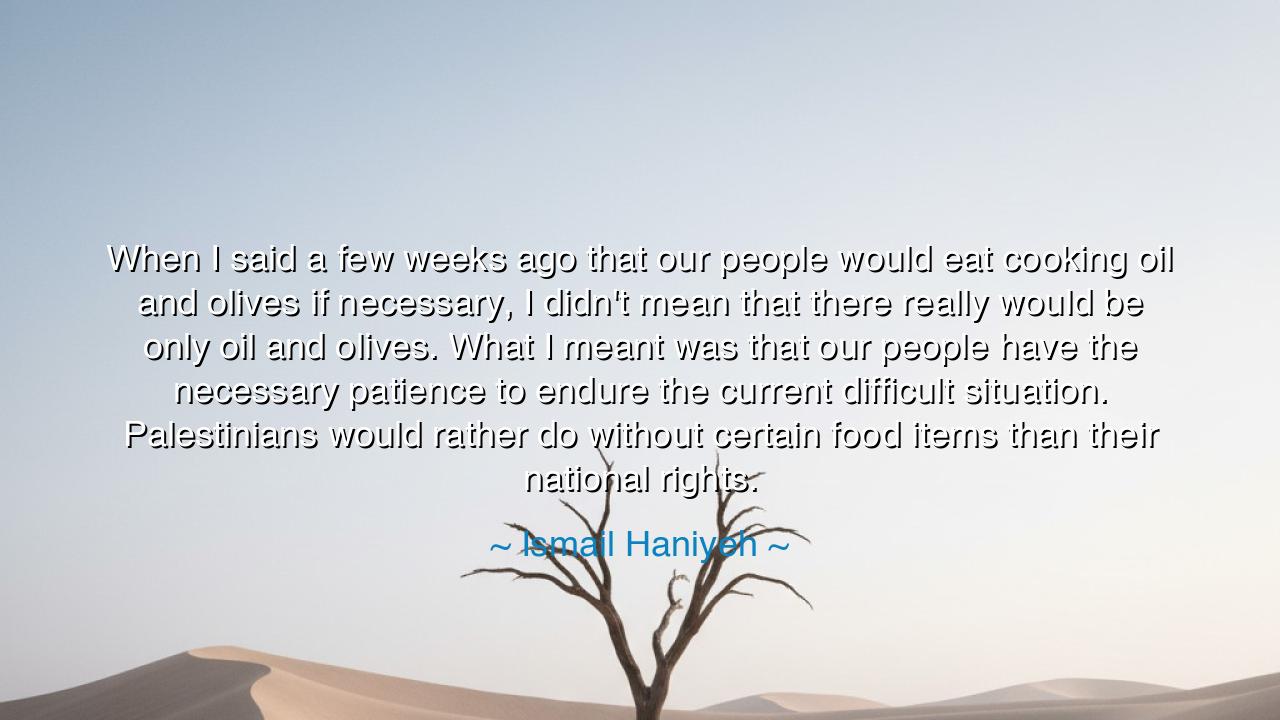
When I said a few weeks ago that our people would eat cooking
When I said a few weeks ago that our people would eat cooking oil and olives if necessary, I didn't mean that there really would be only oil and olives. What I meant was that our people have the necessary patience to endure the current difficult situation. Palestinians would rather do without certain food items than their national rights.






Hear the words of Ismail Haniyeh, spoken in the shadow of hardship and in the fire of endurance: “When I said a few weeks ago that our people would eat cooking oil and olives if necessary, I didn’t mean that there really would be only oil and olives. What I meant was that our people have the necessary patience to endure the current difficult situation. Palestinians would rather do without certain food items than their national rights.” These words, though rooted in the suffering of one nation, ring with the ancient cry of all peoples who have borne hunger and loss for the sake of freedom.
From the earliest days, it has been thus: that when the body is deprived, the spirit must rise. For men and women can endure the emptiness of the stomach if the soul is fed by the fire of hope. The olive itself, symbol of peace and rootedness, stands in Haniyeh’s words as a reminder of endurance. It is humble food, yet it nourishes. It is small, yet it carries deep meaning. So too the people he speaks of: stripped of plenty, yet clinging to dignity, choosing rights above comfort, and freedom above ease.
Consider, O listeners, the story of Mahatma Gandhi and the Salt March. When the British crown sought to bind the Indian people by taxing even the salt of the sea, Gandhi led his people to the shores and lifted the grains of salt in defiance. It was not the richness of a feast, but the simplest of foods, chosen as a symbol of endurance and national dignity. So too with oil and olives: they stand not for scarcity alone, but for the strength of a people who will endure hunger rather than surrender.
Haniyeh’s words speak also to the ancient truth that patience is the strongest weapon of the oppressed. Empires have risen with armies and collapsed when the oppressed refused to bow. Chains are broken not only by sword and fire, but by the quiet strength of those who endure with unyielding will. A nation that can survive on oil and olives, if need be, is a nation that cannot be conquered, for its treasure lies not in its granaries but in its steadfastness.
Yet let us not mistake patience for passivity. To endure hunger in pursuit of rights is not weakness—it is defiance. It is the same spirit that carried the Hebrews through the desert, the same spirit that sustained the besieged of Leningrad, who starved but would not surrender their city. When Haniyeh speaks of olives and oil, he speaks of this same lineage: the spirit of those who endure loss for a cause greater than themselves.
The meaning, then, is this: comfort and plenty are not the highest goods. There are times when a people must choose between bread and honor, and in such times, it is better to suffer hunger than to live without dignity. For food fills the body, but rights and freedom fill the soul. And the soul, once starved of justice, can never truly live, no matter how full the belly may be.
The lesson is clear for all who hear: do not cling to comfort at the cost of principle. Learn to bear hardship with courage when it serves a greater good. In your own life, be willing to sacrifice ease if it means protecting truth, defending justice, or uplifting the oppressed. Practice patience, not as resignation, but as strength. Begin in small acts: forego convenience to act rightly, choose integrity even when it costs you, and remember that every sacrifice for justice strengthens the spirit of freedom.
Thus, O children of time, remember the oil and the olives. They are not only food, but symbols of endurance, of patience, of the unbroken will of a people who value rights above ease. If you take this teaching into your heart, you will understand that the greatest feast is not on the table, but in the soul that has chosen kindness, justice, and freedom above all.






AAdministratorAdministrator
Welcome, honored guests. Please leave a comment, we will respond soon